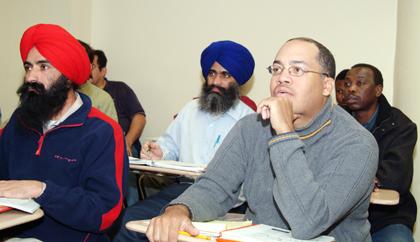By Anna Gustafson
Residents squeezed by the financial woes strangling the country’s economy are flocking to Queens’ City University of New York schools, where officials say students can buff up their résumés and receive degrees needed to land careers for a lower price tag than private universities offer.
“We’ve just started admitting students for our spring semester, and we have already seen about a 10 percent increase from last year,” said Winston Yarde, director of admissions at Queensborough Community College in Bayside. “There’s a 15 percent increase in the direct admit students to file applications at our site.”
Direct admit students are individuals who apply at a specific campus instead of applying to the general CUNY system.
“The students are saying they can’t find a job, and they think it’s time to go back to school while they can’t find work,” he added. “People are looking for a change, and we’ve seen a big increase in our nursing program. Health care is the only field that’s really booming.”
This seems to be the trend across Queens, and everyone from high school graduates who are finding it more affordable to stay close to home to locals who have just been laid off and are hoping to enter a new career field are applying to schools like Queens College, LaGuardia Community College and Queensborough Community College.
“We’ve seen a significant increase for the spring,” said James Muyskens, president of Queens College in Flushing. “It’s very large. We have already admitted 100 additional transfer students from a year ago. People know the education at Queens is very good and is a reasonable price.”
Residents who have lost their jobs and want to acquire the skills to land a second career are going to places like LaGuardia Community College in Long Island City, where students can take classes like a taxi driving course or take a workshop on how to recession-proof their résumé.
“We’ve seen an increase in people in the taxi program, to have that as more of a second job,” said Jane MacKillop, associate dean of the division of adult and continuing education. “You can see students are looking to cover all their bases and options by making sure they’re qualified to the max. They’re taking almost anything that will prepare them for a career in the health or business fields — import/export certification, accounting. There has been a complete drop-off in real estate, but that’s no surprise.”
LaGuardia has seen a 120 percent spike in the number of applicants to the registered nurse program, an 18 percent increase in computerized bookkeeping, a 15 percent jump in import/export certification and a 12 percent gain in the number of students receiving their taxi license.
The number of students enrolling in LaGuardia’s degree programs has also spiked, said Henry Flax, associate dean for enrollment management and student development.
“Last year, we had a total of 200 applications for the direct admit students, the students who come right to our own admissions office instead of CUNY central, and this year we’ve had 470 applications so far,” Flax said. “So we’ve increased by well over 100 percent. This is extraordinary that students are applying earlier and in greater numbers.”
CUNY officials are attributing the application increase to an economy unfriendly to job seekers who need to find affordable education programs. That price tag, however, may increase if the state Legislature passes Gov. David Paterson’s proposal to raise CUNY and SUNY tuition by $300 this spring and $600 next year.
“If it is passed, it will not affect a very large number of our students because they’ll get the financial aid that they need to make up the difference,” Muyskens said. “It will affect the more affluent students because they’ll need to pay that several hundred dollars each semester. But if students get caught in a bind and can’t pay, we will help them. We certainly don’t want students not to be able to move ahead in their academic programs.”
CUNY students currently pay $2,800 annual tuition to attend a community college or about $4,000 a year to go to one of the system’s four-year schools.
York College officials could not be reached for comment.



































